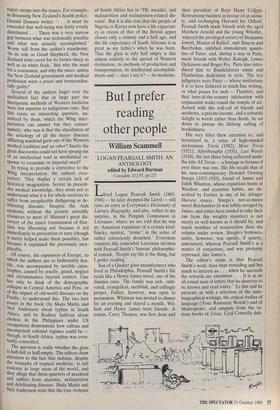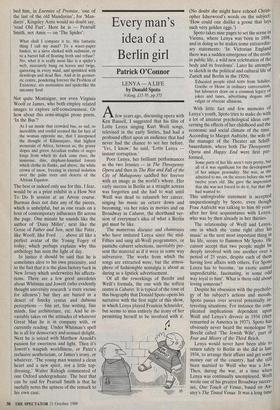But I prefer
reading
other people
William Scammell
LOGAN PEARSALL SMITH: AN ANTHOLOGY edited by Edward Burman
Constable, £12.95, pp.221
Lloyd Logan Pearsall Smith (1865- 1946) — he later dropped the Lloyd — still rates an entry in Everyman's Dictionary of Literary Biography, and also, rather to my surprise, in the Penguin Companion to Literature, where we are told that he was an `American expatriate of a certain kind: finicky, neutral, "ironic" in the sense of rather colourlessly detached.' Everyman counters this somewhat Leavisian sterness with Pearsall Smith's `famous' philosophic- al remark, `People say life is the thing, but I prefer reading.'
Son of a Quaker glass manufacturer who lived in Philadelphia, Pearsall Smith's life reads like a Henry James novel, one of the dimmer ones. The family was rich, culti- vated, evangelical, snobbish, and stiflingly proper. Father, however, was open to persuasion. Whitman was invited to dinner for an evening and stayed a month. Wil- liam and Henry James were friends. A cousin, Carey Thomas, was first dean and then president of Bryn Mawr College. Renouncing business in favour of an annui- ty, and exchanging Harvard for Oxford, Pearsall Smith made friends with the aged Matthew Arnold and the young Whistler, `entered the privileged society of Benjamin Jowett, Master of Balliol', met Binyon and Beerbohm, imbibed immoderate quanti- ties of Pater, and, during a stay in Paris, made friends with Walter Raleigh, Lowes Dickinson and Roger Fry. Paris also intro- duced him to Baudelairean ennui and Flaubertian dedication to style. The key inflpences were Pater — whose misfortune it is to have fathered so much fine writing, or what passes for such — Flaubert, and that turn-of-the-century infatuation with crepuscular walks round the temple of art. Armed with this roll-call of friends and aesthetes, a private income, and a sybaritic delight in words rather than deeds, he sat down to pursue his lifelong calling of bookishness.
His very titles drew attention to, and luxuriated in, a sense of high-minded uselessness: Trivia (1902), More Trivia (1921), Afterthoughts (1931), Last Words (1934), the last three being collected under the title All Trivia — a hostage to fortune if ever there was one. His life recalls that of his near-contemporary Howard Overing Sturgis (1855-1920), friend of James and Edith Wharton, whose expatriate home at Windsor, and eccentric habits, are de- scribed by Forster in one of his Abinger Harvest essays. Sturgis's not-so-minor novel Belchamber (it was loftily savaged by James, and critics have tended to take their cue from this weighty injustice) is not nearly so well-known as it should be, and much worthier of resurrection than the volume under review, Sturgis's homosex- uality, however, was openly, if quietly, announced, whereas Pearsall Smith's is a matter of conjecture, and was probably repressed, like James's. The editor's claim is that Pearsall Smith's work `does bear rereading and has much to interest us . . . when he succeeds the rewards are enormous . . It is as an all-round man of letters that he deserves to be known and read today.' To this end he presents us with a selection of the auto- biographical writings, the critical studies of language (Tour Romantic Words') and of Shakespeare, and snippets from the va- rious books of Trivia. Cyril Connolly dub- bed him, in Enemies of Promise, 'one of the last of the old Mandarins'; for 'Man- darin', Kingsley Amis would no doubt say, `read Old Fart'. Here he is — Pearsall Smith, not Amis — on 'The Spider':
What shall I compare it to, this fantastic thing I call my mind? To a waste-paper basket, to a sieve choked with sediment, or to a barrel full of floating froth and refuse? No, what it is really most like is a spider's web, insecurely hung on leaves and twigs, quivering in every wind, and sprinkled with dewdrops and dead flies. And at its geomet- ric centre, pondering forever the Problem of Existence, sits motionless and spiderlike the uncanny Soul.
Not quite Montaigne, nor even Virginia Woolf or James, who both employ related images to explore self-consciousness. Or how about this semi-imagist prose poem, `In the Bus'?
As I sat inside that crowded bus, so sad, so incredible and sordid seemed the fat face of the woman opposite me, that I interposed the thought of Kilimanjaro, that highest mountain of Africa, between us; the grassy slopes and green Arcadian realms of negro kings from which its dark cone rises; the immense, dim, elephant-haunted forests which clothe its flanks, and above, the white crown of snow, freezing in eternal isolation over the palm trees and deserts of the African Equator.
The hest or indeed only use for this, I fear, would be as a prize exhibit in a How Not To Do It session at an Arvon course. Burman does not date any of the pieces, which is unhelpful, but as one reads on a host of contemporary influences flit across the page. One minute he sounds like the author of 'Daisy Miller', next like the Gosse of Father and Son, next like Pater, like Woolf, like Ford . . . above all like a perfect avatar of the Young Fogey of today; which perhaps explains why this anthology has seen the light of day.
In justice it should be said that he is sometimes alive to his own preciosity, and to the fact that it is the glass factory back in New Jersey which underwrites his affecta- tions. There are a few good anecdotes about Whitman and Jowett (who evidently thought university research 'a mere excuse for idleness') but they are buried in a desert of finicky syntax and dubious perceptions — fine art, fine writing, fine minds, fine architecture, etc. And he in- variably takes on the attitudes of whatever Great Man he is in company with, or currently reading. Under Whitman's spell he is all for democracy and sensual delight. Next he is seized with Matthew Arnold's passion for sweetness and light. Then it's Jowett's waspish worldliness, or Pater's reclusive aestheticism, or James's irony, or whatever. 'The young man wanted a clean heart and a new spirit, not a little top dressing,' Walter Raleigh commented of One Oxford undergraduate. The best that can be said for Pearsall Smith is that he ruefully notes the aptness of the remark to his own case.



























































 Previous page
Previous page